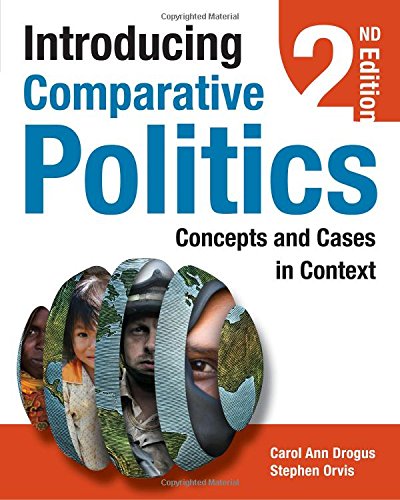Uncomfortable with a strictly thematic approach, or tired of a purely country-by-country organization for your comparative politics course?
Teach the way you want to teach with this innovative hybrid book―fully accessible to students, easy to teach, and satisfying to professors who want to give students a real sense of the questions that drive research in the field. Organized thematically around important concepts in comparative politics―Who rules? What explains political behavior? Where and why?―the book integrates a set of extended case studies in eleven "core" countries. Serving as consistent geographic touchstones, the cases are set in chapters where they make the most sense substantively―not separated from theory or in a separate volume―and vividly illustrate issues in cross-national context.
Features include:
- Core country case studies: Brazil, China, Germany, Japan, India, Iran, Nigeria, Russia, the UK, the U.S., and, new to this edition, Mexico.
- NEW! Methods in Context boxes that model how comparativists do their research and analysis.
- In Context fact boxes that put eye-opening data into thematic context.
- Where and Why? boxes that explore why certain political outcomes occur in some countries but not in others.
- Country and Concept tables that display key indicators for core countries.
Updates and revisions include:
- recent elections around the world and the effects of the global financial crisis and its aftermath,
- authoritarian versus totalitarian regimes,
- ethnic violence,
- racial politics and identity,
- economic globalization,
- executive-legislative institutions, and
- the role of civil society in government.
Carol Ann Drogus is a retired Professor of Government at Hamilton College. She is a specialist on Brazil, religion, and women’s political participation. She taught introduction to comparative politics for more than twenty years, as well as courses on Latin American politics, gender and politics, and women in Latin America. She has written two books and numerous articles on the political participation of women in religious movements in Brazil.
Stephen Orvis is Professor of Government at Hamilton College. He is a specialist on sub-Saharan Africa (Kenya in particular), identity politics, democratic transitions, and the political economy of development. He has been teaching introduction to comparative politics for more than twenty-five years, as well as courses on African politics, nationalism and the politics of identity, political economy of development, and weak states. He has written a book and articles on agricultural development in Kenya, as well as several articles on civil society in Africa and Kenya, and is currently doing research on political institutions in Africa.
